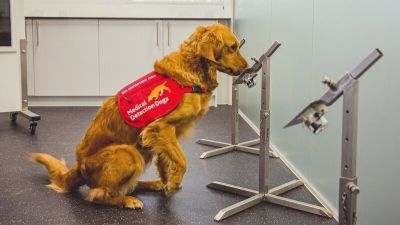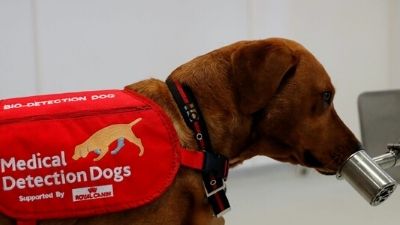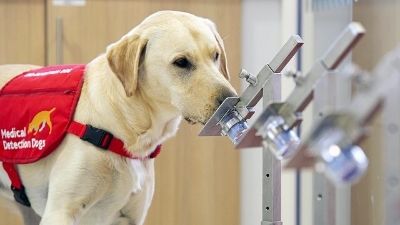A series of studies has shown how effectively dogs can detect coronavirus in sweat or urine samples of infected individuals.
In the last month, two groups of researchers have reported separate findings on sniffer dogs detecting coronavirus infection in humans with remarkable accuracy. Previously, with dogs trained to detect various diseases & drugs, the role of detection dogs has been the subject of a number of studies and experiments during the pandemic.
The evidence so far indicates they can be useful in identifying potentially infected people in crowds but people identified would still need to undergo tests such as RT-PCR and Antigen Test.

What are the new studies?
In April, researchers from the University of Pennsylvania and collaborators published a study in the journal PLOS One describing how nine trained dogs, eight Labrador retrievers, and a Belgian Malinois, identified urine samples from patients who were positive for SARS-CoV-2, discerning them from samples that were negative for the virus. They detected positive samples with 96% accuracy, but their ability was lower to detect false negatives.
Also last week, researchers from the London School of Hygiene and Tropical Medicine and collaborators published a preprint of the findings of a year-long study funded by the UK government. They reported that six trained dogs could identify odor samples from infected people with accuracy up to 94% (comparable with 97.2% for RT-PCR) and ignore uninfected samples with accuracy up to 92% correctly.
Does coronavirus have a smell?
Various studies have found that the waste products from infected people have distinctive smells. Our urine, saliva, and sweat release chemicals, volatile organic compounds, can have different odors depending on whether a person is infected or not.
Last December, French scientists had published yet another study on dogs detecting coronavirus, in PLOS One. “When the virus replicates or make the cell produce its ‘toxic’ molecules, specific molecules are produced and they have to leave the body as metabolites or catabolites,” Professor Dominque Grandjean of the National Veterinary School of Alfort, France, who led the French study, told The Indian Express by email in December. “It has been demonstrated that in the exhaled air we could find molecules that are specific to SARS-CoV-2, like an olfactory signature…” he said.

Why use dogs?
According to Medical Detection Dogs, which trained the dogs for the UK study, a dog possesses a super sense of smell. Humans cannot detect the odors that dogs do.
A 2004 study in BMJ reported that trained dogs correctly identified urine samples of patients with bladder cancer on 22 out of 54 occasions. Medical Detection Dogs cite evidence that dogs may be able to detect Parkinson’s disease years before the onset of symptoms.
For coronavirus, Dubai Airport last year became the world’s first to deploy dogs to detect such infection among passengers. Finland and Lebanon have conducted trials with detection dogs at airports as well.

How the new studies were carried out?
In the US study, the dogs were trained to respond to urine samples from SARS-CoV-2 positive patients and discern positive from negative samples. After three weeks, all nine dogs were able to identify SARS-CoV-2 positive samples with high accuracy. However, they also sometimes responded to negative samples.
In the UK study, odor samples were collected from over 3,000 individuals. LSHTM’s Professor James Logan, who led the project, said, “The dogs were trained over a number of weeks by introducing them to the odor samples from individuals that had tested positive for Covid-19, as well as control samples from people who had tested negative. Samples were presented to the dogs on a stand system and the dogs were rewarded for correctly indicating a positive sample, or for correctly ignoring a negative sample”. If a stand contained a positive sample, the dog would normally sit or point its nose towards the stand. “They correctly ignored any samples that were negative.” Mathematical modeling based on the findings showed that in a real-life setting, trained sniffers could screen over 300 passengers in an airport within 30 minutes.
Does that mean that dogs can be an alternative to RT-PCR tests?
According to the authors of the UK study, they offer it as a complement rather than a substitute. The modeling found that using trained dogs followed by a confirmatory PCR test can detect nearly 91% of infections in both symptomatic and asymptomatic carriers.
These studies, however, were conducted in a trial setting where the dogs were trained in a controlled environment. Beyond the modeling in the UK study, the effectiveness of trained dogs is yet to be determined in a real-world setting.


.jpg)
.png)

.jpg)

.jpg)
.png)


Post a comment